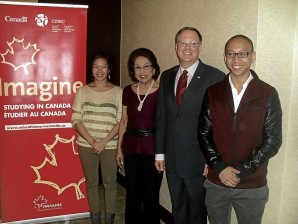Want to study abroad? Look farther north to Canada

FORMER Education Secretary Mona Valisno and Canadian Ambassador Christopher Thornley are flanked by singer Nyko Maca and YouTube sensation Mikey Bustos. Stephen Norries A. Padilla
Students wanting to study abroad may want to visit the first Study in Canada Fair 2013 on Jan. 25 in Makati City and Jan. 26 in Cebu City.
Admission is free.
In Makati, the fair will be held 3-9 p.m. at the Fairmont Hotel. The Marriott Hotel will host the fair in Cebu, from 1-6 p.m.
The Embassy of Canada is inviting students, parents and professionals to attend the fair that will feature at least 17 Canadian schools.
Representatives of the institutions will discuss education opportunities at the K to 12, college and university levels.
Article continues after this advertisementHigh quality
Article continues after this advertisement“Our consistently high level of education across the country, exceptional living standards, safe environment and good access to global career opportunities have made Canada a popular study destination worldwide,” Canada’s Ambassador to the Philippines Christopher Thornley said in a press statement.
In 2012, five Canadian universities made it to the Top 100 of the Times Higher Education World University Rankings, four in the Top 100 of the ARWU Shanghai Ranking and three in the Top 50 of the QS University Ranking.
Almost 240,000 students from all over the world went to study in Canada in 2011. Thornley said Filipinos represented only a tiny percentage of that number.
He said more Filipinos should study in Canada to take advantage of an “affordable education in a stimulating environment while gaining academic credentials that are globally recognized.”
Thornley added, “international students are an advantage for us,” citing some of the economic benefits of having international students like contributing Can$8 billion in revenue and filling 86,750 jobs (students may work) in 2011.
People-to-people ties
Attracting more students and researchers would also contribute to “competitive research… create jobs and economic growth, grow our people-to-people ties in priority markets, help produce a more skilled work force and foster closer ties between Canadian and international education institutions,” Thornley said.
Living and studying in Canada would not be difficult for Filipinos, as Thornley gave the assurance that “people are very friendly in Canada… The cities are not overwhelming and are relatively safe.”
The “large Filipino-Canadian community,” he pointed out, would also ease feelings of homesickness.
Thornley added that the Filipinos’ English proficiency was a distinct advantage.
Filipino-Canadians YouTube sensation Mikey Bustos and celebrity singer Nyko Maca, who both lived and studied in Canada, agreed that fitting in was “not a problem.”
Bustos, who is also a myrmecologist or ant expert, said Filipinos “are highly adaptive… and have a very good reputation” in Canada because they are “happy and friendly.”
Maca said, in Canada, she was able to “assimilate other cultures while [remaining a] Filipino.”
Canada’s college and university education system starts after high school. Since the Philippines has only recently adopted the K to 12 program, interested applicants have to study for two more years in any Canadian public or private school before they can apply for admission to college or university.
The Canadian school year is divided into two semesters, the first typically running from September to December and the second, January to April. Some institutions offer May to August options.
Depending on location and program choices, a recommended annual budget can range from Can$17,700 to Can$27,700 (roughly P730,000 to P1.14 million). The amount covers tuition, accommodation, books, supplies, health care and personal expenses.
Scholarships are available based on academic merit and are often awarded automatically at the time of admission. Some scholarships are specifically for international students but they may require separate application.
More information is available at www.scholarships.gc.ca.
Successful applicants have to apply for a study permit after being accepted by a school. They will get letters of acceptance from the schools that they can use in applying for the permit.
Applicants should also present proof of identity and evidence that they have sufficient funds for the stay in Canada.
Participating in the Study in Canada Fair 2013 are Canadian Independent College, Fulford Academy and Stanstead College for the K to 12 level; Langara College, Alexander College, Centennial College, St-Laurence College, Algonquin College, Humber College, Seneca College, Loyalist College and SAIT Polytechnic for college (two- to three-year technical vocational courses); and University Canada West, Emily Carr University of Art and Design, University of British Columbia, University of Saskatchewan, and University of New Brunswick for university education.
For more information, visit the event’s Facebook page at facebook.com/StudyInCanada2013 and follow @CanadaFair2013 on Twitter.